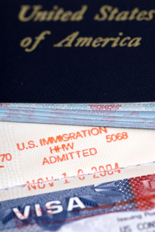U.S. Immigration |
|||||||
| 2/11/2002 | |||||||
New Relief for “Age-out” Cases |
|||||||
|
|||||||
|
Its objective is certainly meritorious: to prevent the
unnecessary separation of parents and children simply
because the child has "aged out" (or turned 21) during
the pendency of the application. For this month's discussion, we will limit our focus to the ways in which family-based applications for lawful permanent residency are affected by CSPA. This discussion will best be understood with a little background information on the different categories for family-based immigration. As any "seasoned immigrant" will know, there are 5 categories for family-based immigrant applications: |
 |
||||||
|
|
|||||||
|
Immediate relative minor unmarried child and spouse of USC and parent of USC First preference unmarried son or daughter (i.e. child over 21) of USC 2A preference spouse and unmarried minor child (under 21) of US LPR 2B preference unmarried son or daughter(over 21) of USLPR 3rd preference married son or daughter of USC (whether a minor child or child over 21) 4th preference sister or brother of US citizen Below is a detailed discussion on the effects of this law as they apply to different scenarios, although such discussion cannot encompass, or even begin to anticipate, all possible scenarios and their corresponding changes. |
|||||||
How the law affects Immediate Relatives of US citizens:When a form I-130 is filed for the child of a U.S. citizen, as a result of CSPA, this child will remain eligible to adjust status or receive an immigrant visa as the immediate relative of a U.S. citizen, even if the child turns 21 before adjustment of status or immigrant visa issuance takes place, provided that the child remains unmarried. Thus, despite INS processing delays with respect to the I-130 petition, and despite any processing delays in the adjudication of the adjustment of status application or in the consular processing, this same child who was the Beneficiary of an I-130 as late as age 20 will be able to obtain immigration benefits as a "child" well beyond the time that same child turned 21. Similarly, if an I-130 is filed on behalf of the child of a U.S. lawful permanent resident, if that same U.S. LPR parent naturalizes before the child turns 21, then the child will be considered an "immediate relative" and will adjust status or receive an immigrant visa as the child of a U.S. citizen even if such adjustment of status or visa issuance takes place past that child's 21st birthday. This law has very important implications especially for nationals of the Philippines who must wait years and years, far longer than nationals of other countries because of the annual country limitations, to obtain lawful permanent residence. For example: Juan obtained his lawful permanent residency on the basis of his sister's I-130 petition filed on his behalf more than 25 years ago. Two years later, he marries Maria and files her I-130 petition under the 2nd preference category (spouse of US LPR). He also files a petition for Carlos, her child from her previous marriage, who is 15. Based on calculations resulting from per country limitations, it is anticipated that if Juan does not naturalize, both Maria and Carlos must wait approximately 5 years before they are able to apply for lawful permanent residency on the basis of the I-130s filed by Juan on their behalf. However, three years later (after having been a US LPR for 5 years, Juan becomes a U.S. citizen, and both Maria and Carlos, are eligible as immediate relatives to file for their adjustment of status applications. However, by the time the adjustment of status application is filed, Carlos is only 3 days away from turning 21. Even if INS were to expedite the processing of his application, with fingerprint processing delays it is impossible for the application to be approved before Carlos' 21st birthday. Before the passage of the CSPA, when Carlos turns 21 he will "age out", and his pending application for adjustment of status will be denied if he turns 21 before a decision is reached. With CSPA, however, Carlos will be considered a "child" for immigration purposes, and therefore eligible to adjust as the immediate relative child of a U.S. citizen, even if at the time of the adjudication of his application he is 21 or over, because Juan became a naturalized U.S. citizen before Carlos turned 21. In fact, even if the adjustment of status application is filed when Carlos is 21 or over, he is still eligible to adjust as a child because Juan naturalized when Carlos was still 20. How does this law affect married children?Perhaps it would be best to illustrate by way of example. Claudio becomes a naturalized US citizen and files an I-130 on behalf of his married son, Emmanuel, who is 18 at the time. Even though Emmanuel is under 21, because he is married, he is not considered an "immediate relative", and is instead relegated to the 3rd preference category for the married sons or daughters of US citizens. For nationals of the Philippines, 3rd preference beneficiaries must wait approximately 15 years before they can be eligible for adjustment of status or consular processing. Emmanuel and his wife are divorced due to irreconcilable differences when he is 20. Emmanuel is now eligible to apply for lawful permanent residency as the immediate relative child of a U.S. citizen. Again, even if the application is approved well beyond his 21st birthday, he is eligible to adjust as an immediate relative child because he was divorced before his 21st birthday. How the law affects the other preference categories:CSPA also affects "age out" issues with respect to those family members who seek to adjust or obtain immigrant visas in the other visa categories (i.e., not as immediate relatives of US citizens). Immigrating family members who are not considered immediate relatives of US citizens are subject to "priority dates", established on the date the I-130 petition was filed. These categories are affected by CSPA by locking in the beneficiary's age on the date that the I-130 petitions's priority date becomes current, minus the number of days that the petition was pending, provided that the beneficiary seeks to acquire LPR status within one year of such availability. As an example, let's take the case of Pedro, who is a USLPR and who filed an I-130 on behalf of his child, Pedrito, on August 15, 1997, when Pedrito was 18 years old (2A) The priority date, established on the day INS received the I-130 petition, is August 15, 1997. The petition was pending for 3 years and approved in September of 2000. By then, Pedrito was 21 years old. However, his priority date was not current at the time, so Pedrito could not do anything about his approved I-130 petition. Per this month's Visa Bulletin, the visa numbers for this priority date -- for the minor unmarried children of USLPRs (Preference 2A) - are available at this time. (See the monthly changes on the Visa Bulletin by logging on to www.travel.state.gov/visa_bulletin.html) But Pedrito, by now, is already 23 years old. Under the old law, Pedrito would have automatically moved categories to 2B when he turned 21, provided he remained unmarried. As such, his visa numbers would not be available until approximately 3 years from today. Under CSPA, however, his "age" will be calculated as follows: 23 (age the priority date becomes current) minus 3 (number of years that the I-130 was pending) equals 20 (Pedrito's "age" per CSPA). Based on the above calculations, therefore, despite the fact that Pedrito is now 23, he is still eligible to apply for lawful permanent residence as the minor child of a USLPR (2A). Important Caveat: The CSPA provides that beneficiaries of family-based petitions who seek to adjust or acquire immigrant visas under categories under than that of the immediate relative of a USC, must do so within one year of the priority date becoming current. Therefore, if Pedrito's priority date became current 2 ˝ years ago, and he was then eligible as a minor to apply for lawful permanent residency but didn't, then he will not be able to use CSPA now to apply for residency. Important CSPA provision affecting Philippine nationals:CSPA also allows the Beneficiary to "choose" whether or not they wish to have their age "recalculated" for purposes of transferring categories. This is most especially helpful for nationals of the Philippines, who have long faced the following anomaly not experienced by other countries: the priority date for unmarried sons or daughters (over 21) of US citizens is significantly more backed up than the priority date for unmarried sons or daughters (over 21) of US lawful permanent residents. For years, this has resulted in the unfortunate decision by many of our US lawul permanent resident senior citizens not to apply for US citizenship just so that their adult children could enter the United States earlier than they would have to if these US LPRs applied for US naturalization. Under the old law, a beneficiary of a petition filed by a then-US LPR parent (under the 2B preference category) would automatically be reclassified as a first preference as soon as the parent/petitioner naturalized. Under CSPA, the same beneficiary could choose not to be subject to this automatic conversion and thus continue to be considered for immigrant status under the second preference (2B). The CSPA will affect every I-130 petition currently pending with the INS. It also affects every petition that has been approved where there is no final INS decision on the immigrant visa or adjustment of status application. (Part 2 of this series, appearing in next month's issue, will focus on the CSPA as it affects employment-based immigration petitions.)This article reflects the legal opinions of the author. It is not meant as legal advise nor should it be construed as such. To obtain legal advise on your particular case, please seek legal assistance from a qualified attorney specializing in these matters. |
|||||||
|
|||||||
|
Terms of Use. Privacy Policy. Disclaimer.
|





 is a partner in the law offices of Barcelona & Pilarski, P.A. She is a licensed attorney practicing primarily in the area of U.S. immigration law. She is a graduate of the University of Florida, where she obtained her J.D. and B.A. degrees. She is a member of the Florida Bar Assn., The American Bar Assn., and the American Immigration Lawyers Assn. She may be contacted at Tel (239) 590-9864
is a partner in the law offices of Barcelona & Pilarski, P.A. She is a licensed attorney practicing primarily in the area of U.S. immigration law. She is a graduate of the University of Florida, where she obtained her J.D. and B.A. degrees. She is a member of the Florida Bar Assn., The American Bar Assn., and the American Immigration Lawyers Assn. She may be contacted at Tel (239) 590-9864 